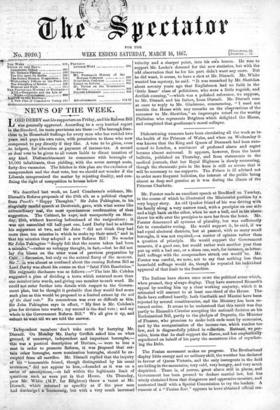Independent members don't take much by harrying Mr. Disraeli. On
Monday Mr. Darby Griffith asked him on what ground, if uncorrupt, independent and important boroughs,— this was a poetical description of Devizes, — were to lose a seat in order to promote Reform, it was Proposed that cer- tain other boroughs, mere nomination boroughs, should be ex- empted from all sacrifice. Mr. Disraeli replied that the inquiry of his "honourable friend, though distinguished by his usual acuteness," did not appear to him,—founded as it was on a series of assumptions,—to fall within the legitimate limit of questions such as were put in that House. On Thursday, poor Mr. White (M.P. for Biighton) threw a taunt at Mr. Disraeli, which returned as speedily as if the poor man had discharged a boomerang, but with a very much increased
velocity and a sharper point, into his on bosom. He rose to support Mr. Locke's demand for the new statistics, but with the odd observation that he for his part didn't want any more. But he did want, it seems, to have a shot at Mr. Disraeli. Mr. White wanted less mystery, he said. "It was remarked by Mr. Sheridan about seventy years ago that Englishmen had no faith in the 'little Isaac' class of politicians, who were a little roguish, and devilish cunning,"—which was a polished reference, we suppose, to Mr. Disraeli and his father, Isaac Disraeli. Mr. Disraeli rose at once to reply to Mr. Gladstone, commencing, "I need not trouble the House with any remarks on the observations of the successor to Mr. Sheridan," an impromptu retort on the worthy Philistine who represents Brighton which delighted the House, and completed that gentleman's moral collapse.






























